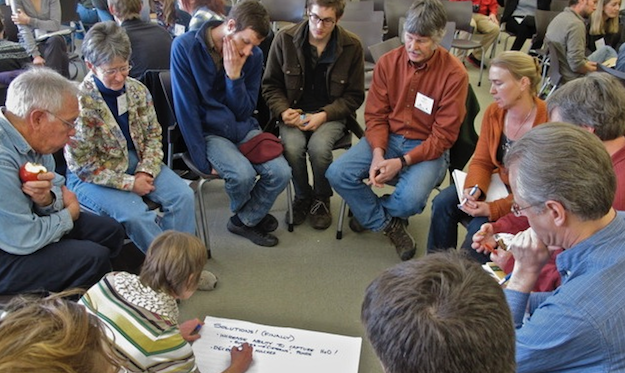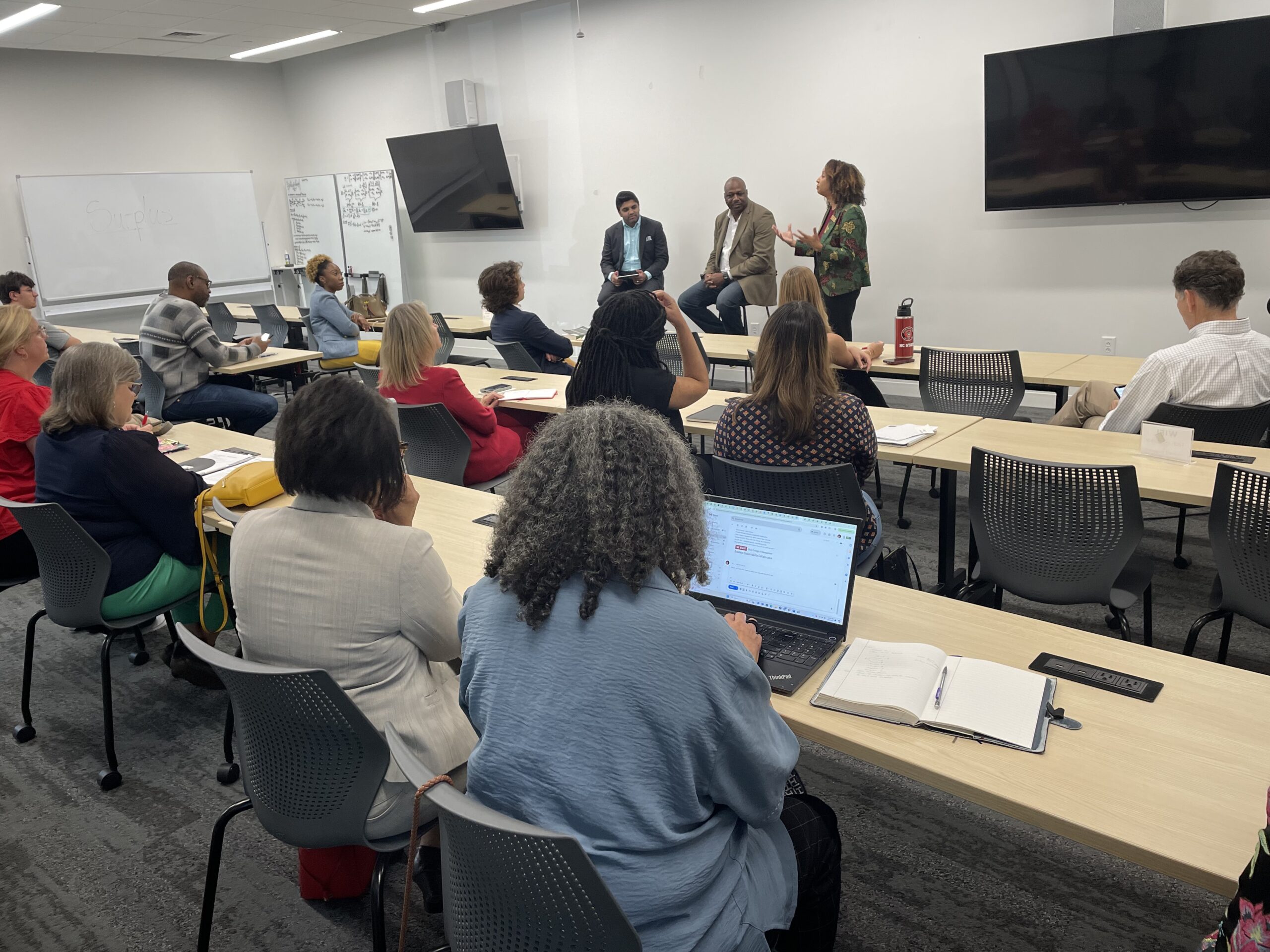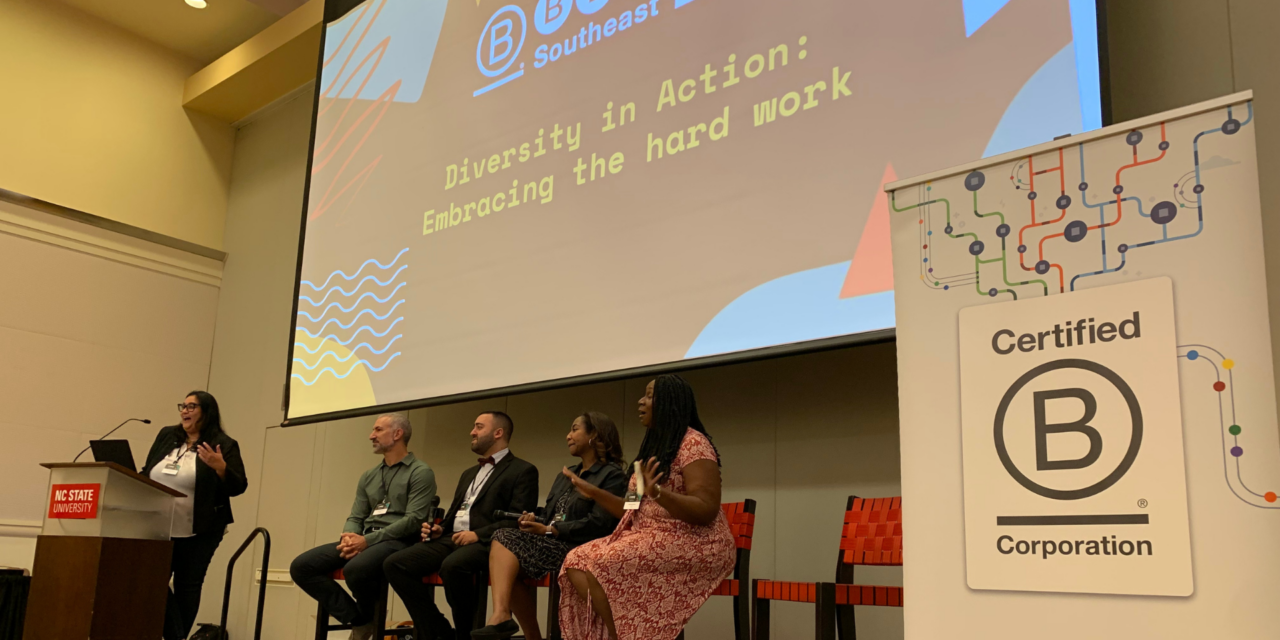FARM COMMUNITY EXPLORES ADAPTING TO CLIMATE CHANGE

A group of farmers, researchers and food advocates discuss annual crop production. Photo: Rachel Tinker Kulberg
Back in the fall of 2012, Pittsboro, NC farmer Laurie Heise called the Abundance Foundation with a question:
“How do I prepare for climate change on my small, diversified farm?”
Abundance Foundation didn’t have an answer. So the Abundance staff started calling around and in doing so they found that they not alone. It seemed many farmers, thinkers and organizations were themselves wondering the same thing.
An idea for a conference was born.
Over 140 farmers, agriculture researchers, and activists convened at the Farming Strategies Conference for Today’s Changing Climate in February 2013 in Pittsboro, NC.
Farmers shared observations of increases in unpredictable and extreme weather events, greater heat and drought causing early bloom drop, decreased fruit production, not to mention an environment that was more difficult for farm workers. It became clear there was a need for researchers and farmers to work together to tackle these challenges.
On February 7th 2014, another farming conference will be held in Pittsboro, NC to help North Carolina farmers and gardeners adapt their production methods to climate change. The 2nd Annual Farming Adaptation Conference, hosted by the Abundance Foundation, educates North Carolina farmers about risk and variability of crops and livestock, and provides strategies for reducing vulnerabilities for today and five to ten years down the road.
With a quick internet search, you’ll uncover that cities like Minnesota, Edinburgh and areas of Brazil, Europe, Australia, and Scandinavia are holding conferences to help entire cities and countries adapt to climate change. Some events are in their third consecutive year, but most do not primarily focus on agricultural resilience for a specific region.
Conferences with the goal of helping communities work together to adapt to climate change on a community scale, from the bottom-up, are still uncommon. What is the best model to ensure everyone is given a voice?
The adaptation conference in Pittsboro, NC next month is small (there were 140+ attendees in 2013), and focuses on the Piedmont of North Carolina. The conference will be geared towards farmers, gardeners, agriculture researchers and local food advocates unafraid of changing the ways “things have always been done.”
Attendees will take part in discussions on topics such as water and weather challenges forecasted for North Carolina, tools and techniques for effective season extension, why and how to create a strong regional organic seed system, farm-scaping strategies to increase water retention and soil carbon, and how farmers can help shape policy in relation to fracking and other potential future challenges.
Farmers will also have the opportunity to make connections with local university researchers and non-profit organizations who will help them design new plans and programs, since many farms need funding opportunities or other assistance to reduce risk associated with implementing new methods.
What does this mean for a highly rural area of North Carolina known nationally for its small, diverse farms and strong farm-to-fork support network?
Well, with farmers who are educated on risks and vulnerabilities associated with current and future climate variability, local food sheds are less prone to crop failure, job loss, and extreme price fluctuation. All North Carolina residents will benefit from a stable and diversified local food shed using eco-friendly production methods.
The 2nd Annual Farming Adaptation Conference takes place on Friday, February 7th at Central Carolina Community College in Pittsboro from 8 AM to 4 PM. The full schedule and registration are available online.
Pre-conference Opening Event
The unique conference kicks off on February 6th with a reception at the Fearrington Barn featuring a panel offering global perspectives on carbon and climate and the state of our world. The conference’s “Amuse Bouche” will be hosted by Frank Stasio of WUNC’s “The State of Things” and the panel will include Albert Bates (author of The Biochar Solution, The Post Petroleum Survival Guide and Cookbook, and Climate in Crisis and cofounder of Global Village Institute for Appropriate Technology), as well as Liane Salgado, Michiel Doorn and Lyle Estill. The event will include appetizers, drinks, and New Orleans Jazz from the Decatur Street Beat Band.
Reserve tickets and find out more.
- Categories:


